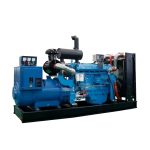Introduction
In today's modern world, there is a growing need for reliable power sources in remote locations. Whether it's for powering off-grid communities, running essential infrastructure, or supporting remote operations, having a dependable source of electricity is crucial. In these situations, diesel generators play a vital role in providing the necessary power supply. This article will explore the importance of diesel generators for remote control applications, their key features and benefits, as well as the challenges and considerations involved in using them in such environments.
150KW Diesel Generator For Sale of Diesel Generators in Remote Control
Remote control refers to the operation and monitoring of equipment and systems from a distance, often in isolated or hard-to-reach locations. In such scenarios, having a reliable power source is essential to ensure continuous operation and communication. Diesel generators are well-suited for remote control applications due to their robustness, fuel efficiency, and ability to provide a stable power supply even in challenging environments.
One of the primary roles of diesel generators in remote control is to serve as a backup power source. In remote areas where grid power may be unreliable or unavailable, diesel generators can provide a reliable source of electricity to keep essential systems running smoothly. This is particularly important for critical infrastructure such as telecommunications towers, remote monitoring stations, and off-grid communities that depend on a constant power supply to function effectively.
Diesel generators are also commonly used in remote control applications for their portability and ease of deployment. In situations where temporary power sources are needed, such as during emergency response operations or construction projects in remote areas, diesel generators can be quickly transported to the site and set up to provide the necessary power supply. Their versatility and ability to operate in a wide range of environmental conditions make them a popular choice for remote control applications.
Key Features and Benefits of Diesel Generators
Diesel generators offer a range of features and benefits that make them well-suited for remote control applications. Some of the key advantages of diesel generators include:
1. Reliability: Diesel generators are known for their reliability and durability, making them a dependable source of power in remote locations where grid power may be unreliable. Their robust design and simple mechanical components contribute to their long lifespan and low maintenance requirements, ensuring continuous operation even in harsh environments.
2. Fuel Efficiency: Diesel generators are more fuel-efficient compared to gasoline generators, making them a cost-effective option for remote control applications where fuel availability may be limited. The higher energy density of diesel fuel allows diesel generators to run for longer periods on a single tank, reducing the need for frequent refueling in remote areas.
3. Power Output: Diesel generators are capable of providing high power output, making them suitable for powering a wide range of electrical equipment and systems in remote locations. Whether it's running heavy machinery, charging batteries, or supporting communication networks, diesel generators can deliver the necessary power supply to meet the demands of remote control operations.
4. Versatility: Diesel generators are versatile and can be used in a variety of applications, from emergency backup power to continuous primary power supply. Their ability to operate in extreme temperatures, high altitudes, and other challenging conditions makes them ideal for remote control applications where reliability is paramount.
5. Easy Maintenance: Diesel generators are relatively easy to maintain, with simple mechanical components that are easy to service and repair. Routine maintenance tasks such as oil changes, filter replacements, and inspections can be performed quickly and easily, minimizing downtime and ensuring optimal performance of the generator in remote locations.
Challenges and Considerations
While diesel generators offer many benefits for remote control applications, there are also some challenges and considerations that need to be addressed when using them in such environments. Some of the key challenges include:
1. Environmental Impact: Diesel generators emit greenhouse gases and air pollutants during operation, which can have negative environmental impacts, especially in remote areas with sensitive ecosystems. Mitigating the environmental impact of diesel generators may require the use of emission control technologies or exploring alternative power sources such as renewable energy systems.
2. Fuel Supply: Diesel fuel availability can be a concern in remote locations, where transportation and storage of fuel may be challenging. Ensuring a reliable fuel supply for diesel generators is crucial to avoid interruptions in power supply and maintain continuous operation in remote control applications.
3. Noise and Vibration: Diesel generators can be noisy and produce vibrations during operation, which can be a concern in remote areas where noise pollution and vibrations may affect nearby residents or wildlife. Implementing soundproofing measures and vibration isolation systems can help reduce the noise and vibrations generated by diesel generators in remote locations.
4. Security: Diesel generators are valuable assets that may be at risk of theft or vandalism in remote areas with limited security infrastructure. Implementing security measures such as surveillance cameras, fencing, and remote monitoring systems can help protect diesel generators from unauthorized access and ensure their safe operation in remote control applications.

Conclusion
In conclusion, diesel generators play a crucial role in powering remote control operations by providing a reliable and efficient source of electricity in isolated or hard-to-reach locations. Their robustness, fuel efficiency, and high power output make them well-suited for a wide range of remote control applications, from emergency backup power to continuous primary power supply. While there are challenges and considerations involved in using diesel generators in remote environments, their numerous benefits outweigh the drawbacks, making them an essential component of remote operations worldwide.
